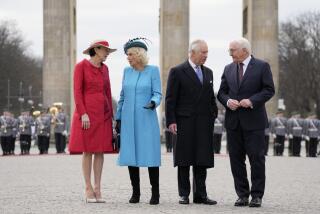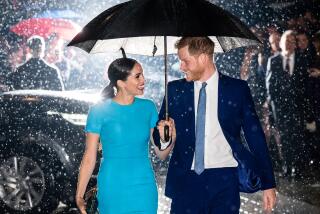Charles, Diana End Tour; Reviews Are Mixed
- Share via
BONN — The Prince and Princess of Wales ended their weeklong tour of West Germany on Saturday with bouquets from the Germans and brickbats from some British commentators back in London.
Princess Diana regularly made the front pages of the German press in a dazzling array of costumes, while Prince Charles won compliments for his speeches in German.
The royal couple’s trip was being closely watched by British reporters traveling with them to determine the accuracy of reports that their six-year-old marriage is encountering stormy weather.
The couple behaved impeccably toward one another in their frequent public appearances, leading some royal watchers to conclude that stories of a royal rift may have been exaggerated.
On their last day in Hanover, capital of the state of Lower Saxony, Diana, wearing a red wool jacket and a knee-length red skirt, and Charles said farewell at the Herrenhausen Palace, built for the mother of King George I.
Recalling the strong influence of German blood in his lineage, Charles emphasized the close ties between some German aristocrats and the British Royal Family, the name of which was Saxe-Coburg and Gotha before it was changed to Windsor during World War I.
“You cannot walk far in London without coming across a Hanover Square, or Hanover Place,” he said referring to the German House of Hanover that gave the British throne six sovereigns from George I to Victoria.
Later, visiting British forces at nearby Celle, Charles said that the troops “play a vital part in guaranteeing the security, and hence the liberty, of Western Europe.”
For the prince to voice even such obvious sentiments put him on dangerous ground with politicians in London, since the heir to the throne is not supposed to involve himself in political issues.
The chief criticism of his visit to West Germany came from left-wing Labor Party members who objected to his statements Thursday about the role of the British nuclear deterrent force. Charles told the audience that Britain’s “nuclear deterrent is committed to the alliance and therefore acts as an umbrella for the Federal Republic (of Germany).”
But stating the obvious did not go down well with Labor members of Parliament, who objected to the prince’s seeming approval of the government’s policy on nuclear deterrence, a position the left wing of the party rejects.
“It is quite wrong of the prince to have said this,” argued Frank Dobson. “He ought to know it is a matter of great political insensitivity in this country. He is supposed to stay clear of such things.”
Even the staid Times of London played the remarks and the reaction on the front page.
Charles also incurred the wrath of the jingoist sensational press for remarks he made to West German army officer cadets at Bundeswehr University at Neubiberg.
Praises German Officers
Again, Charles stated the obvious: that Germany is “well known for the excellence of its military officers down through history.”
This truism, often noted by military historians, sent the British tabloids up in arms.
The Sun said that the prince’s description of the German officer corps--a view probably shared by British army veterans who fought the Wehrmacht in World War II--was “amazing” and sure to offend British veterans.
Not to be outdone, the rival Daily Star said: “Charles Says German Soldiers Are Wunderbar. “
The Star called the serious-minded heir to the throne, “Prinz Poppycock.”
In reporting the British reaction, the German newspaper Bild translated “Prinz Poppycock” as “Prince Dumb-babbler.”
“With the British popular press at your throat,” an observer here said, “Charles must be realizing that it is not easy being a prince.”
More to Read
Sign up for Essential California
The most important California stories and recommendations in your inbox every morning.
You may occasionally receive promotional content from the Los Angeles Times.













